MercoPress. South Atlantic News Agency
Economy
-
Wednesday, March 30th 2016 - 08:23 UTC
Yellen says the Fed will 'proceed cautiously' and in no hurry to raise interest rate

Federal Reserve Chair Janet Yellen said on Tuesday that the Fed still envisions a gradual pace of interest rate increases in light of global pressures that could weigh on the economy. Yellen did not specify a timetable for further hikes to follow the Fed's rate increase in December from record lows. She said the risks to the United States remain limited but cautions that assessment is subject to “considerable uncertainty.”
-
Wednesday, March 30th 2016 - 08:00 UTC
Argentina wins a first round at the WTO over a biodiesel controversy with the EU
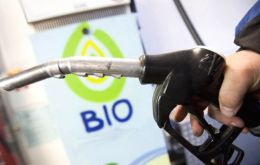
The World Trade Organization (WTO) ruled on Tuesday in favor of Argentina in a series of complaints the country filed with the international body, challenging punitive duties by the European Union on its biodiesel imports. The WTO, however, said the EU was not violating its rules.
-
Monday, March 28th 2016 - 06:16 UTC
Argentina: Month long conflict has Ushuaia paralyzed and under “siege” by pickets
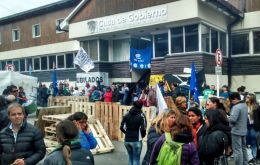
A labor judge from Tierra del Fuego in the extreme south of Argentina was unable to unlock a 25-day conflict between the provincial government and striking public employees since both sides stood by their position and rejected conciliation efforts.
-
Monday, March 28th 2016 - 05:47 UTC
Macri visit to China in September: the strategic relation with Beijing stands, says Argentine ambassador
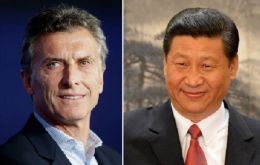
Argentine ambassador to Beijing Diego Guelar confirmed a meeting between President Mauricio Macri and his Chinese counterpart Xi Jinping next April first on the margins of the Nuclear Security Summit that begins next week in Washington and anticipated an official visit to China by Macri in September.
-
Saturday, March 26th 2016 - 07:15 UTC
Mercosur prepares to celebrate 25th anniversary hoping it can be 'reborn' under Argentine leadership
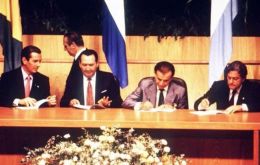
On Saturday 26 March the Asuncion Treaty, which gave birth to Mercosur, the Common Market of the South, will be 25, and even with celebration plans the mood of its members is not enthusiastic following years of “too much ideology” and “too little trade and business”, distant from the original idea and purpose.
-
Friday, March 25th 2016 - 05:26 UTC
Unemployment in Brazil reaches 9.5%, the highest level since 2012
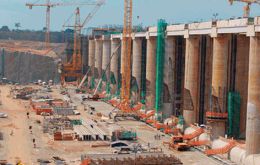
Unemployment in Latin America's largest country is at its highest level since 2012, the Brazilian government said on Thursday. Brazil's IBGE statistics bureau said that the jobless rate in the three months through January was 9.5%, compared to the 6.8% in the same period one year ago.
-
Friday, March 25th 2016 - 05:20 UTC
US government supports Argentine appeal to lift injunctions in its debt dispute
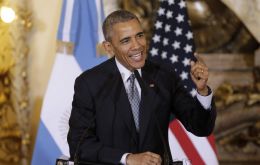
In another display of support for the Argentine administration of president Mauricio Macri, the government of the United States affirmed it has “significant foreign policy interests” in finding a “rapid” resolution to the long-standing dispute between Argentina and bondholders.
-
Thursday, March 24th 2016 - 02:03 UTC
Brazilian Supreme Court emerges with a decisive role in the institutional crisis
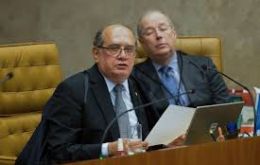
The Brazilian government's efforts to have former president Lula da Silva into the cabinet of president Dilma Rousseff will have to wait until next 30 March when the Supreme Court is scheduled to hold its next full meeting. The political upheaval and simultaneous legal back-and forth has reached such a pitch that it inspired a bleakly funny website, lulaeministro.com, or “Is Lula a minister?” The site shows only the former president’s face and the words, “At this moment, No.” (Or yes, depending).
-
Thursday, March 24th 2016 - 01:16 UTC
Time bomb in Brazil: list of 200 names of politicians from 18 parties who received illegal funds for elections

Odebrecht, the engineering firm at the heart of Brazil's biggest ever graft probe, on Tuesday agreed to cooperate with prosecutors, in a move likely to send shockwaves across political parties that for years illegally siphoned money from state contracts. Federal police found an office to pay bribes and it surfaced that since February it has a list of 200 politicians who benefited from siphoned funds for election campaigns.
-
Thursday, March 24th 2016 - 01:10 UTC
Brazil's chief of staff warns about the “dangerous precedent” of ousting an unpopular government
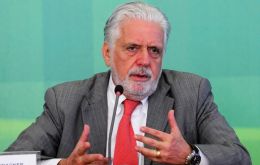
Brazilian President Dilma Rousseff's chief of staff on Wednesday said ousting her would set a “dangerous” precedent for unpopular governments to be toppled in the future. On Tuesday Rousseff said that ongoing impeachment proceedings against her in Congress constituted a “plot” against Brazil's institutions and the nation's stability.
